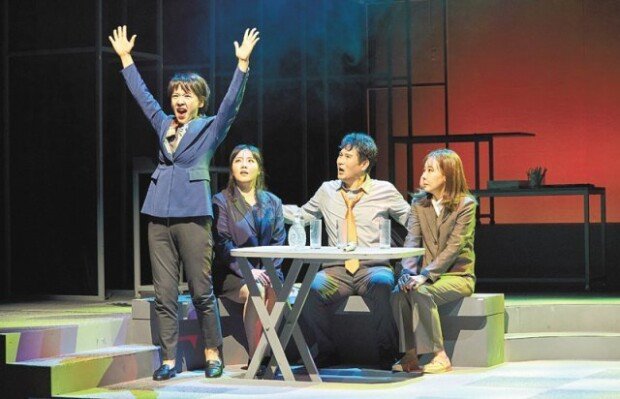Ji-young erased from the world is recovered on play
Ji-young erased from the world is recovered on play
Posted September. 22, 2022 08:06,
Updated September. 22, 2022 08:06

The play begins with Kim Ji-young gazing at the window of the living room. Ji-young’s unstable state appears troubling, as she does household chores and looks after her child expressionlessly amid cries of her daughter less than a year old fills the stage.
The play “Kim Ji-young, Born 1982,” remade after Cho Nam-Joo’s best-selling novel published in 2016 and has sold more than 1.38 million copies since and exported to 31 countries including the U.S. and Japan, is performed at the Baekam Art Hall in Gangnam, Seoul.
Ji-young was born as the second daughter among three siblings in the 1980s, when boys were preferred over girls. Unlike her older sister, Ji-young was accustomed to her parents’ favoritism over her brother. In the last year of university, Ji-young is even told by her father that she should stay put and get married. After she got a job at a company, she experiences sexual harassment at company dinners and gets disadvantageous treatment as a potential mother that treats her work carelessly. After giving birth to her child and quitting her job so that she could look after her child full-time, Ji-young is ridiculed by others as a “mom-roach.”
Ji-young experiences all sorts of discrimination and eventually behaves as if she is not herself and another person, as if “the world has erased Ji-young” (lines from Dae-hyeon). Ji-young is diagnosed with postpartum depression, but childbirth and parenting do not seem to be the cause for all her problems. The play portrays Ji-young’s life for more than 30 years, hinting that her condition is caused by Ji-young’s whole life.
Unlike the novel, in which the ending hints that Ji-young’s condition is unlikely to be addressed by her efforts alone, the play focuses on her recovery. Her husband, previously depicted as a hopeless bystander and contributor to structural discrimination, becomes a supporter who sympathizes with Ji-young’s pains and helps her recover. This deviation is perhaps to evade the criticism that the novel received for depicting men as beneficiaries of discriminatory social structure. “The episode in which the husband experiences discrimination at work for taking childcare leave is described in more detail that in the novel. By doing this we wanted to provide a new perspective,” said the production crew.
The play runs for around 100 minutes, is fast-paced and keeps the audience’s attention strong throughout the end. The production is intriguing, showing individual events in chronological order yet in a creative manner. All the characters, leading and supporting roles playing multiple characters, display excellent acting. The play runs through November 13 and tickets range from 55,000 to 77,000 won.
Ji-Hoon Lee easyhoon@donga.com
Headline News
- Joint investigation headquarters asks Yoon to appear at the investigation office
- KDIC colonel: Cable ties and hoods to control NEC staff were prepared
- Results of real estate development diverged by accessibility to Gangnam
- New budget proposal reflecting Trump’s demand rejected
- Son Heung-min scores winning corner kick







